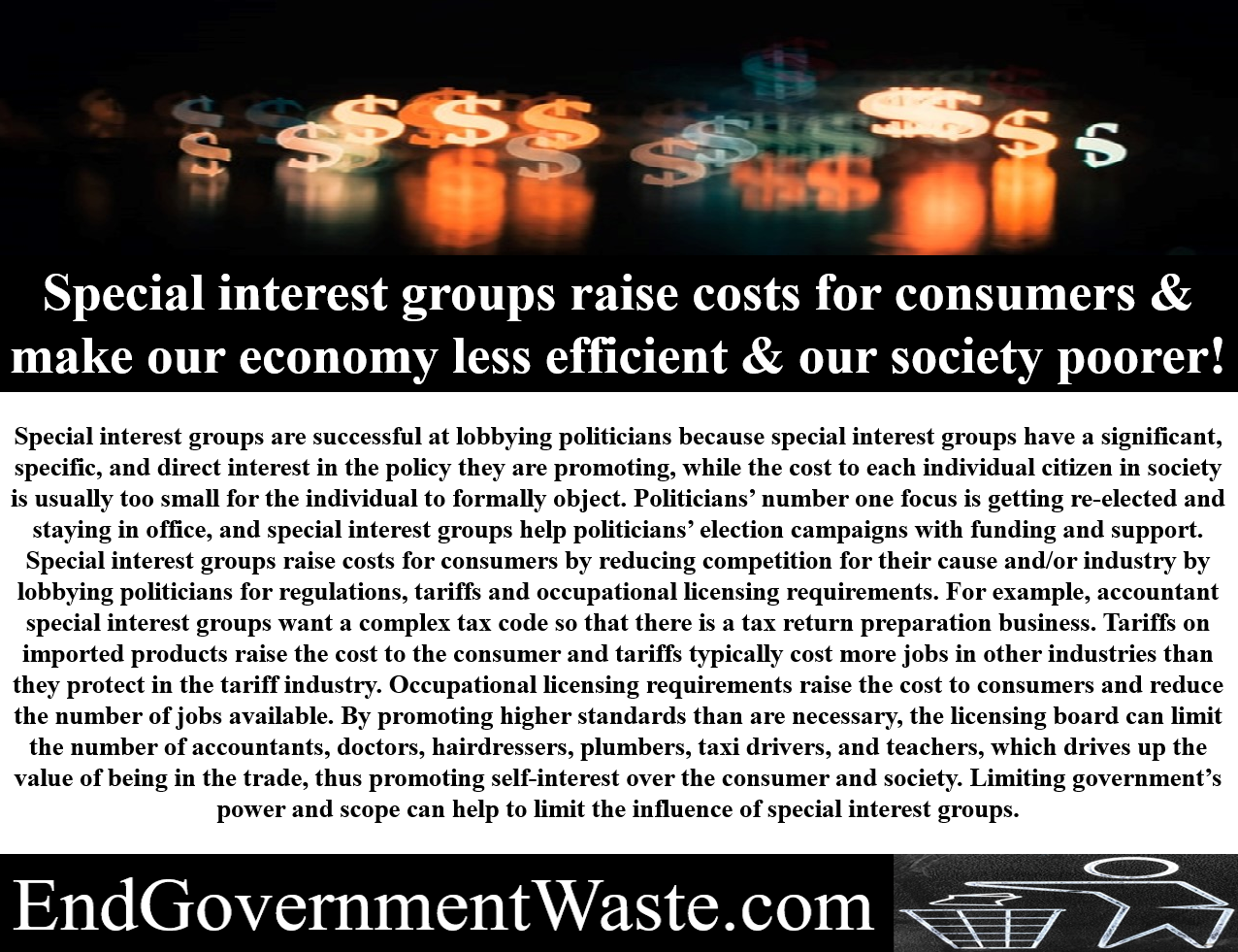
Special interest groups raise costs for consumers & make our economy less efficient & our society poorer!
Special interest groups are successful at lobbying politicians because special interest groups have a significant, specific, and direct interest in the policy they are promoting, while the cost to each individual citizen in society is usually too small for the individual to formally object. Politicians’ number one focus is getting re-elected and staying in office, and special interest groups help politicians’ election campaigns with funding and support.
Special interest groups raise costs for consumers by reducing competition for their cause and/or industry by lobbying politicians for regulations, tariffs and occupational licensing requirements. For example, accountant special interest groups want a complex tax code so that there is a tax return preparation business. Tariffs on imported products raise the cost to the consumer and tariffs typically cost more jobs in other industries than they protect in the tariff industry. Occupational licensing requirements raise the cost to consumers and reduce the number of jobs available. By promoting higher standards than are necessary, the licensing board can limit the number of accountants, doctors, hairdressers, plumbers, taxi drivers, and teachers, which drives up the value of being in the trade, thus promoting self-interest over the consumer and society. Limiting government’s power and scope can help to limit the influence of special interest groups.
More information…
Special interest groups make our economy less efficient and our society poorer, and they waste scarce resources.
Special interest groups are groups of people or an organization representing an industry seeking or receiving special advantages, typically through political lobbying. Special interest groups are successful at lobbying politicians because special interest groups have a significant, specific and direct interest in the policy or industry they are promoting, while the cost to each individual citizen in society is usually too small for the individual to formally object. Politicians’ number one focus is getting re-elected and staying in office, and special interest groups help politicians’ election campaigns with funding and public support. Because the benefits are so great for the special interest, it pays the special interest to spend a lot of money to help elect, and re-elect, politicians that will support their interests. These costs of lobbying are a complete waste of scarce resources that could be avoided if politicians didn’t have the ability to dole out favors and create special advantages in exchange for financial and political support.
Special interest groups raise costs for consumers by reducing competition for their cause and/or industry by lobbying politicians for regulations, tariffs and occupational licensing requirements. For example, accountant special interest groups want a complex tax code so that there is a tax return preparation business. The corn industry wants ethanol in your gas, because it pushes up the demand for corn, and thus the price of all corn products to the consumer.
Tariffs on imported products raise the cost to the consumer and tariffs typically cost more jobs in other industries than they protect in the tariff industry. By raising the cost of the imported products, the tariff allows domestic companies to charge consumers higher prices.
Occupational licensing requirements raise the cost to consumers and reduce the number of jobs available. By promoting higher standards than are necessary, the licensing board can limit the number of accountants, hairdressers, lawyers, plumbers, taxi drivers or teachers, which drives up the value of being in the trade, thus promoting self-interest over the consumer and society.
Government actions that help special interest groups are almost always at the expense of other interest groups and society as a whole. Limiting government’s power and scope can help to limit the influence of special interest groups.
